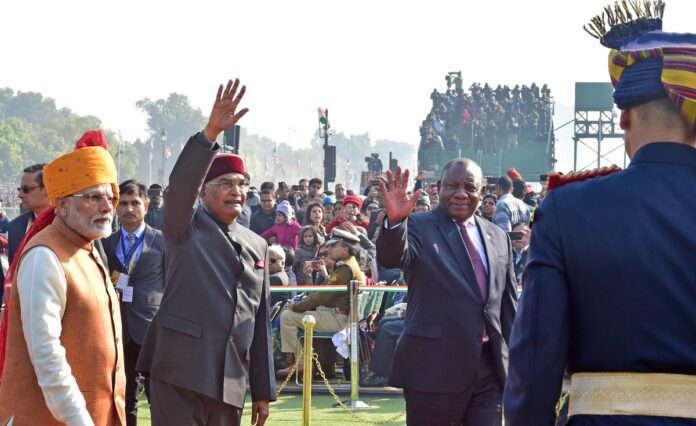The tiny African nation Gambia has recently been in the news due to the unfortunate deaths of 70 children from July to September, reportedly connected to four paediatric cough syrups made in India. In September, Gambia’s Government opened an investigation into the deaths of children. And in October, WHO (World Health Organization) Director-General Tedros announced that the spate of child fatalities in Gambia was caused by four contaminated cough and cold syrups produced by an Indian company Maiden Pharmaceuticals. In addition, the WHO also issued a warning and forced the Gambian Government to remove Maiden Pharma’s pharmaceuticals from the market.
By Samir Bhattacharya
The samples of medicines in question were being tested by the Gambian authorities and the results of the tests were awaited. But, even before the claim that the medicines produced in India were actually adulterated or were responsible for the child’s death, several articles came up blaming India’s pharmaceutical industry as a whole, with titles such as “India fast turning into global pharmacy of fake medicines”.
Though such a claim had not been proved yet Dr S Jaishankar, Indian Minister of External Affairs, sent his sympathies to the Gambian Minister of Foreign Affairs, Dr Mamadou Tangara, immediately after the news. He emphasised that the case is under careful investigation by the proper authorities and pledged to keep in touch. In addition, India’s top regulatory authority, Central Drugs Standard Control Organization (CDSCO), also immediately launched an enquiry over the mishap. The Indian Government also set up a committee of four specialists to provide recommendations for future action after considering and studying the negative event reports, causal links, and other associated details supplied by the WHO. Finally, the manufacturer of the medicines, Maiden Pharmaceuticals Ltd, fully assisted the Indian government as well as the WHO with its investigation.
Following the WHO order, the Gambian Government recalled all the medicines containing paracetamol or promethazine syrup and launched an enquiry. And now the result is out. On 31st October, Tijan Jallow, from Gambia’s Medicines Control Agency, stated that the exact cause of the deaths had not yet been determined. He also added that the test results of the medications that the kids took were found to be safe. Further, according to the Gambia’s health regulatory authority, 95% of deaths were caused by “viruses” and “bacteria” that could have spread due to unprecedented rainfall and widespread flooding. Now, this finding by the Gambian authority creates an interesting twist to the story. And this definitely raises the question that why WHO was in such a rush to blame India-made medicines for the mishap.
There is no doubt that in several African nations, there exist multiple rackets circulating fake Indian medicines. At times, some of these may have been made by unregistered manufacturers in India, who would make drugs based on the prices paid for the drug. But that takes place informally and is also a rare case. In the majority of the cases of fake Indian medicines in Africa, there are actually some rival companies from other nations who manufacture fake medicines using Indian brand names and dump them in African markets where Indian pharmaceuticals are well-respected.
As a matter of fact, India has been fighting these false accusations of India-made counterfeit drugs for more than a decade now. Earlier in 2009, India was accused of supplying counterfeit anti-malarial generic pharmaceuticals to Nigeria. Upon enquiry, it was revealed by the National Agency for Food and Drug Administration and Control (NAFDAC) of Nigeria that the counterfeit medicines with the “Made in India” label were, in fact, produced in China. It was also revealed that considering the size of the seized consignment, there is a high possibility that many other African countries are using these wrongly labelled fake medicines. Undoubtedly, there are many multinational firms who would want to discredit India and label its drugs as substandard, in order to gain greater access to the African markets.
Today, India is the leading supplier of low-cost generic medicines to Africa. India provides Africa with 45 percent of all generic medicines. According to recent research, 20% of India’s $17 billion in pharmaceutical exports is Africa bound. Over the past ten years, India’s pharmaceutical exports to Africa and the world have more than doubled to reach $24.5 billion in 2021. Very recently, PM Modi emphasised that the world has come to trust Indian pharmaceuticals and that India could be referred to as the “pharmacy to the world.” Now, these unfavourable reports about the efficacy and security of Indian medicines are clearly an attempt to tarnish the reputation of the industry.
From 2010 to 2019, India was the third-largest investor in Africa’s healthcare sector, trailing only the United Kingdom and the United States, with a 19% share. During this time, the total global investment in Africa’s healthcare sector was $1.1 billion, with India accounting for $210 million in it. The majority of this FDI has gone toward general medical and surgical hospitals (82.4%), outpatient care centres, medical and diagnostic laboratories (14.7%), and nursing and residential care facilities (1.6%). In addition to Indian hospitals and healthcare service providers, pharmaceutical manufacturing companies have a strong presence in Africa. India has also announced a $10 million contribution to the India-Africa Health Fund.
Given its progress in the healthcare sector in terms of infrastructure, technology, accessibility, and affordability, today India can meet the needs of Africa’s health systems. More than 50,000 African patients visit India on a medical visa each year, reflecting the demand for India’s affordable and high-quality healthcare. Nigeria, Kenya, Tanzania, Ghana, South Africa, Sudan, Zambia, and Mozambique send the most number of patients to India. Namibia, Tunisia, Algeria, Morocco, and Ethiopia are the other leading countries.
While we talk about economic growth and development in Africa, without investment in health care, economic development is not possible. Till March 31, 2021, the Indian Exim Bank had extended credit lines to several African countries for health projects totaling $1.6 billion. Given the importance of India in providing medicines to Africa, it is important to enhance collaboration between Indian healthcare providers and African partners in areas such as capacity building, the establishment of hospitals and investment in telemedicine.
Hospital construction is a specialty of Indian firms such as Larsen & Toubro, Shapoorji Pallonji, and others. They have the experience in building high-end hospitals in the GCC countries. And they are also skilled at developing budget-oriented hospitals in India and other emerging economies. In India, hospital groups such as Apollo, Fortis, and others have developed the skills, expertise, processes, and vision required for a sustainable medical ecosystem. Twinning India’s hospital construction and management expertise will be a focussed, win-win approach for Africa and also enhance India’s overall relationship with Africa.
India’s partnership with Africa on healthcare has a long history. The multifaceted and deep-rooted India-Africa partnership found its apt expression during the challenging times of Covid pandemic as both sides work with a remarkable spirit of collaboration and cooperation. And true to its ethos of ‘Vasuvaidha Kutumbakam’, India donated essential medicines and made-in-India Covid vaccines during the pandemic, reinforcing its comparative advantage as the world’s pharmacy.
At a time when Western powers were stockpiling vaccines, India’s humanitarian approach towards Africa gained immense goodwill. Between January and March 2021, 24.4 million made in India COVID-19 vaccines were delivered to Africa. 8.4 million Vaccines were exported under commercial arrangements to five African countries: Mauritius, Morocco, Egypt, Algeria, and South Africa. One million vaccines were distributed to 17 African countries as an international grant and approximately another 15 million vaccines were distributed to 26 African countries under the COVAX initiative.
On July 14 and 15, the African Union’s Executive Council voted to create an African Center for Medicine, a pan-African medicines agency headquartered in Rwanda. The Center’s mandate will be to strengthen state parties’ and regional economic communities (REC) capacity to monitor and control medical products and improve Africa’s access to adequate safe and high-quality medical products. While the decision to develop a continental medical body is timely and much truly necessary, the Center’s effective execution will undoubtedly necessitate numerous international collaborations and provides India with an opportunity to collaborate.
The relationship between India and Gambia, including in the pharmaceutical sector, has a promising future. Therefore, India must act proactively to prevent any backslide of this strong bonding. The incident should serve as a red flag for India and no matter who or what is behind this accident; the culprit must be found and duly punished. India must remain focussed on strengthening its partnership with Africa as a win-win for both sides and support the pharmaceutical industries in their growth. This collaboration will eventually benefit Africans who will receive better healthcare and medical treatment.
This article first appeared in www.vifindia.org and it belongs to them.








